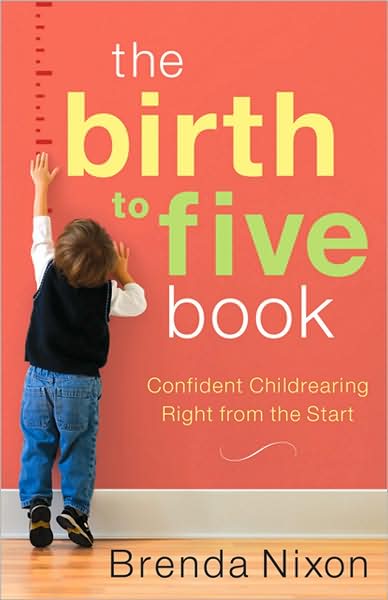Spanking is a furiously debated issue and one that may begin for you in these early years. Parents, both for and against the practice, herald research and quote childrearing experts who support their position. I've met parents who are militant in their stance and condemn others for opposing views.
As a speaker, I've been criticized by a few audience members because I didn't tell parents to spank as an act of love and godly parenting. Some Christian parents claim the Bible commands them to spank, while others believe less physical methods are equally loving and appropriate. Research is confusing; advice is conflicting. Who and what does a parent believe?
One reason people argue for spanking is that it is seen as an acceptable way to teach children not to do things, to stop them when they're being annoying, and to encourage them to behave in appropriate ways. It's been documented that the southern United States practices spanking more than other areas, and some cultures do it more than others do. Obviously, just as there's no one right way to raise a child, there's no one right way to correct a child. I came to my own decision regarding this discipline method, and you must too.
There's a little information from both sides of the argument presented here. Maybe this will drive your curiosity to research the issue and make a decision you can live with.
In The First Three Years of Life, researcher and author Burton L. White, PhD, asserts, "There is no evidence that children who have been spanked (not abused) when they are young become either aggressive older children or abusive parents."¹ The long-term research needed to test that theory, says White, hasn't been done. Psychologist and author of The Strong-Willed Child, Dr. James Dobson, agrees. He says it is nonsense that "specialists" claim spanking makes kids more violent and teaches them to hit others. White says, "Two-thirds of the successful families we have observed from all levels of society have used occasional mild physical punishment with their children after they entered the second year."² Yet, both caution parents on the use of spanking. Dobson recommends reserving this response for a child's "willful defiance."
In May 1995, Parents magazine published a persuasive article, "What's Wrong with Spanking?" The writer referred to Benjamin Franklin's famous line "Spare the rod, spoil the child" as a "mentality," declaring her uneasiness with spanking. She could not "in good conscience endorse it as a loving and caring discipline method."³
Several years ago, the American Medical Association (AMA) released a study by Murray Straus, PhD, codirector of the Family Research Laboratory, University of New Hampshire, Durham. Depending on how you read his study, you can come to different conclusions.
Dr. Straus suggests that if parents reduce or eliminate spanking it "could have major benefits for children and reduce anti-social behavior in the society."4
However, he admits that frequent spanking doesn't necessarily lead to anti-social behavior; that would be like saying that frequent smoking always leads to death from a smoking-related disease. Dr. Straus concludes with, "Corporal punishment is associated with an increased probability of societal violence," but "even if all parents stopped hitting their children, it would not mean the end of violence."5 So agrees Dr. Sal Severe, author of How to Behave So Your Children Will, Too! He devotes chapter 18 to enabling the parent to "evaluate the practice of spanking," but cautions its use. To read more, check out "The Debate over Spanking" published online at the Clearinghouse on Early Childhood and Parenting, http://ceep.crc.uiuc.edu/eecearchive/digests/1997/ramsbu97.html.
If you choose to spank your child, first stop and ask yourself three questions: Is it safe? Is it effective? Is it safer and more effective than alternatives? These questions can be your criteria before employing any course of discipline. Harshly used, any form (time-out, consequences, verbal reprimands, etc.) of discipline when you're angry and uncontrolled can inject painful emotional wounds and cultivate bitterness in your child.
Occasionally, I spanked a young Lynsey and Laura. Those times occurred when words were ineffective, or when I needed them to immediately stop a dangerous behavior. However, I've learned, through twenty-six years of parenting and research, that while spanking halts one behavior, it does not bring about the desired one. It's my job to teach appropriate behaviors, not just stop inappropriate ones.
Thus, the controversy continues to exist. So what do you do? To me, the squabble over spanking is really about a method, not the need for discipline. Kids need to accept that the adult is in charge and to learn self-controlled, respectful behaviors. Moreover, they feel loved when parents take the time to patiently and persistently discipline. So discipline your child, and refrain from criticizing others for their childrearing practices.
The real issue becomes what you are doing to continually teach your child self-controlled, respectful behavior. It takes a great deal of forethought, patience, and time to discipline. It takes stamina to learn what works with your child. The one thing experts do agree on is that parenting demands enormous perseverance.
Whatever your method, remember this: anyone can discipline your child without loving him, but you cannot love your child without disciplining him.
Isn't parenting complicated?
Published February 27, 2009

Brenda Nixon, MA, is a frequent media guest sharing childrearing insights and encouragement, and a popular speaker to parents and professionals who work with children. She has spoke at MOPS International and Hearts at Home national conventions, AEYC conferences, and citywide parent expos. A member of the Advanced Writers and Speakers Association and a CLASS graduate, Nixon is a contributing author to dozens of books and has extensive training in child development and parent empowerment.








